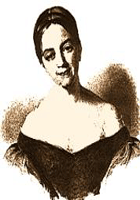On An Engraving Of Hindoo Temples Poem by Letitia Elizabeth Landon
On An Engraving Of Hindoo Temples
LITTLE the present careth for the past,
Too little—'tis not well!
For careless ones we dwell
Beneath the mighty shadow it has cast.
Its blessings are around our daily path,
We share its mighty spoil,
We live on its great toil,
And yet how little gratitude it hath.
Look on these temples, they were as a shrine
From whence to the far north
The human mind went forth,
The moral sunshine of a world divine—
That inward world which maketh of our clay
Its temporary home;
From whence those lightnings come,
That kindle from a far and better day.
The light that is of heaven shone there the first
The elements of art,
Mankind's diviner part;
There was young science in its cradle nurst.
Mighty the legacies by mind bequeathed,
For glorious were its pains
Amid those giant fanes,
And mighty were the triumphs it achieved
A woman's triumph mid them is imprest
One who upon the scroll
Flung the creative soul,
Disdainful of life's flowers and of its rest.
Vast was the labour, vast the enterprise,
For she was of a race
Born to the lowest place,
Earth-insects, lacking wings whereon to rise.
How must that youthful cheek have lost its bloom,
How many a dream above
Of early hope and love
Must that young heart have closed on like a tomb.
Such throw life's flowers behind them, and aspire
To ask the stars their lore
And from each ancient store
Seek food to stay the mind's consuming fire.
Her triumph was complete and long, the chords
She struck are yet alive;
Not vainly did she strive
To leave her soul immortal on her words.
A great example has she left behind,
A lesson we should take,
Whose first task is to wake
The general wish to benefit our kind.
Our sword has swept o'er India; there remains
A nobler conquest far,
The mind's ethereal war,
That but subdues to civilize its plains.
Let us pay back the past, the debt we owe,
Let us around dispense
Light, hope, intelligence,
Till blessings track our steps where'er we go.
O England, thine be the deliverer's meed,
Be thy great empire known
By hearts made all thine own,
By thy free laws and thy immortal creed.
This poem has not been translated into any other language yet.
I would like to translate this poem
This poem is subtitled Hindoo temples and palace at Madura Landon added the following notes: * Madura was at one period the centre of might, majesty, and dominion' in India. One of its ancient monarchs in the second century sent an embassy on a splendid scale to Augustus Caesar at Rome. It was also the spot, from the meridian of which the Hindoo astronomers made their calculations. The mode of calculating by the ten numerals, after having been invented and long practised here, was first introduced into Europe by the Arabs. Here too, was the celebrated college whose influence was exercised so beneficially on the intellect of India; though at present much decayed, it is still in great repute for the magnificent ruins which surround it, and for the fine pagoda and choultry in its neighbourhood. Among other anecdotes connected with the spirit of Improvement now alive in India, Sir Alexander Johnstone, whose kindness in communicating information I cannot sufficiently acknowledge, told me one, of his relative, the late Mrs. Darner. The question of female education was much disputed, and popular opinion was certainly against it. Sir Alexander, however, brought this instance of a connexion of his own, who united birth and all social advantages with the highest degree of cultivation. At his request, Mrs. Darner made a bust of Nelson, and sent it as a present to the King of Tanjore. It was received with great attention, and the skill with which it was executed made a strong impression in favour of female education. ** When I speak of a a woman's triumph, I allude to the celebrated Avyia. She was a Pariah of the lowest class, but obtained such literary distinction, that her works are to this day the class-books of the scholars of the highest rank and caste in all the Hindoo schools of the peninsula of India.